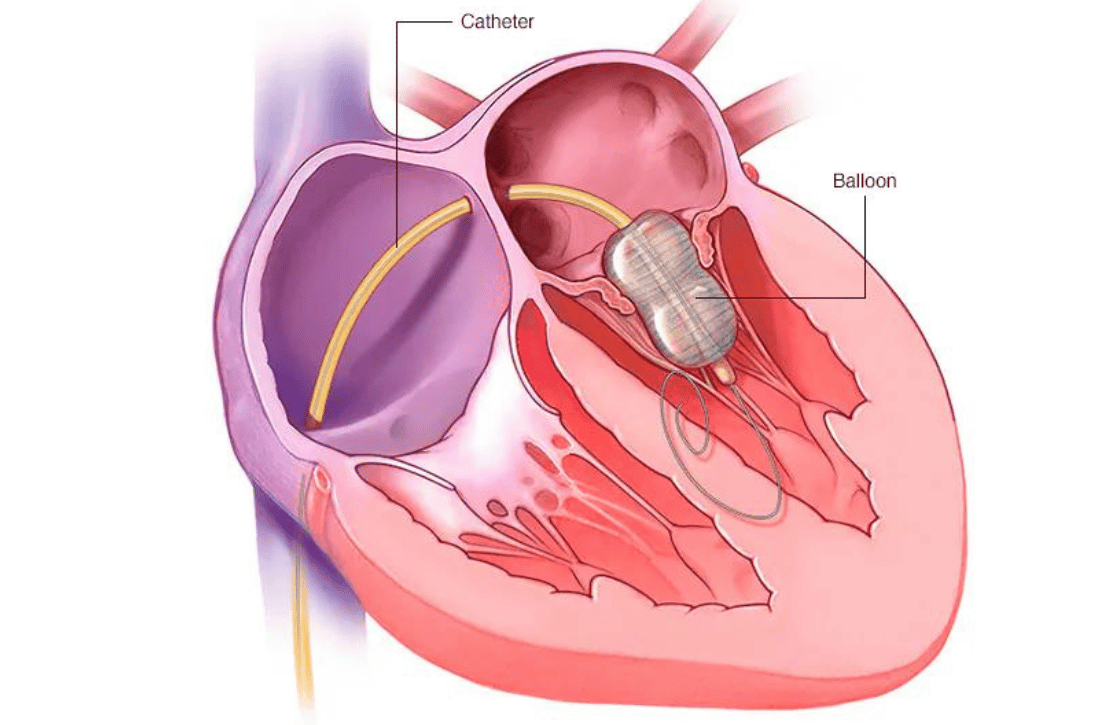Balloon Mitral Valvotomy
Home - Balloon Mitral Valvotomy

Balloon Mitral Valvotomy (BMV), also known as Percutaneous Mitral Balloon Valvotomy (PMBV), is a minimally invasive procedure designed to treat mitral stenosis. Mitral stenosis is a condition where the mitral valve, located between the left atrium and left ventricle of the heart, becomes narrowed, impeding blood flow. This procedure uses a balloon catheter to widen the narrowed mitral valve, improving blood flow and reducing symptoms.
Understanding Mitral Stenosis
Mitral stenosis is often caused by rheumatic fever, which can lead to scarring and thickening of the mitral valve. As the valve narrows, it restricts blood flow from the left atrium to the left ventricle, leading to symptoms such as:
- Shortness of breath
- Fatigue
- Palpitations
- Chest pain
- Swelling in the legs and feet
If left untreated, mitral stenosis can lead to serious complications, including atrial fibrillation, pulmonary hypertension, and heart failure.
Indications for Balloon Mitral Valvotomy
Balloon Mitral Valvotomy is typically recommended for patients with moderate to severe mitral stenosis who meet certain criteria, such as:
- Symptomatic mitral stenosis despite medication
- Favorable valve anatomy suitable for balloon dilation
- Absence of severe mitral regurgitation or left atrial thrombus
- High risk for surgical valve replacement due to other medical conditions
The Balloon Mitral Valvotomy Procedure
Pre-Procedure Preparation
Before undergoing BMV, patients will undergo a thorough evaluation, including:
- Medical history and physical examination
- Echocardiogram to assess the severity of mitral stenosis and valve anatomy
- Electrocardiogram (ECG) to evaluate heart rhythm
- Blood tests to ensure overall health and readiness for the procedure
Procedure Steps
- Anesthesia: The procedure is usually performed under local anesthesia with sedation or general anesthesia, depending on the patient’s condition.
- Accessing the Heart: A catheter is inserted through a vein, typically in the groin, and guided to the heart using fluoroscopic imaging.
- Balloon Positioning: The catheter is advanced to the mitral valve, and a deflated balloon is positioned across the narrowed valve.
- Balloon Inflation: The balloon is gradually inflated to widen the mitral valve, improving blood flow from the left atrium to the left ventricle. This process may be repeated several times to achieve the desired result.
- Completion: Once the valve is adequately widened, the balloon is deflated and the catheter is removed. The insertion site is then closed and bandaged.
Recovery and Follow-Up Care
Post-procedure, patients are typically monitored in a recovery area for several hours or overnight. Most patients can return to normal activities within a few days. Follow-up care includes:
- Regular check-ups with a cardiologist to monitor heart function and valve performance
- Echocardiograms to assess the effectiveness of the procedure
- Medication management to support heart health and prevent complications
Benefits of Balloon Mitral Valvotomy
Pre-Procedure Preparation
Before undergoing BMV, patients will undergo a thorough evaluation, including:
- Medical history and physical examination
- Echocardiogram to assess the severity of mitral stenosis and valve anatomy
- Electrocardiogram (ECG) to evaluate heart rhythm
- Blood tests to ensure overall health and readiness for the procedure
Procedure Steps
- Anesthesia: The procedure is usually performed under local anesthesia with sedation or general anesthesia, depending on the patient’s condition.
- Accessing the Heart: A catheter is inserted through a vein, typically in the groin, and guided to the heart using fluoroscopic imaging.
- Balloon Positioning: The catheter is advanced to the mitral valve, and a deflated balloon is positioned across the narrowed valve.
- Balloon Inflation: The balloon is gradually inflated to widen the mitral valve, improving blood flow from the left atrium to the left ventricle. This process may be repeated several times to achieve the desired result.
- Completion: Once the valve is adequately widened, the balloon is deflated and the catheter is removed. The insertion site is then closed and bandaged.
Recovery and Follow-Up Care
Post-procedure, patients are typically monitored in a recovery area for several hours or overnight. Most patients can return to normal activities within a few days. Follow-up care includes:
- Regular check-ups with a cardiologist to monitor heart function and valve performance
- Echocardiograms to assess the effectiveness of the procedure
- Medication management to support heart health and prevent complications
Benefits of Balloon Mitral Valvotomy
BMV offers several advantages, including:
- Minimally invasive approach with shorter recovery time compared to surgical valve replacement
- Effective symptom relief and improved quality of life
- Reduced risk of complications associated with open-heart surgery
- Preservation of the natural mitral valve structure
Conclusion
Balloon Mitral Valvotomy is a valuable treatment option for patients with mitral stenosis, offering a minimally invasive approach to relieve symptoms and improve heart function. Dr. Ankeet Dedhiya and our experienced team of cardiologists and interventional specialists are dedicated to providing personalized care and utilizing advanced techniques to ensure the best outcomes for our patients. If you are experiencing symptoms of mitral stenosis or have been diagnosed with this condition, we are here to support you with comprehensive evaluation and treatment options tailored to your needs.
For more information or to schedule a consultation, contact Dr. Ankeet Dedhiya today.
FAQ
Frequently Asked Questions
Balloon Mitral Valvotomy is a minimally invasive procedure used to treat mitral stenosis, a condition where the mitral valve becomes narrowed, restricting blood flow. The procedure involves using a balloon catheter to widen the narrowed valve.
Candidates for BMV are typically patients with moderate to severe mitral stenosis who have symptoms despite medication, have favourable valve anatomy, and do not have severe mitral regurgitation or left atrial thrombus.
Preparation for BMV includes undergoing a thorough medical evaluation, which may involve a physical examination, echocardiogram, electrocardiogram (ECG), and blood tests. Your cardiologist will provide specific instructions on medication adjustments and fasting before the procedure.
During BMV, a catheter with a deflated balloon is inserted through a vein, typically in the groin, and guided to the mitral valve. The balloon is then inflated to widen the valve, improving blood flow. The procedure is performed under local anaesthesia with sedation or general anaesthesia.
The procedure usually takes about 1-2 hours, but preparation and recovery time may extend your stay in the hospital for several hours or overnight.
Most patients can resume normal activities within a few days after the procedure. Your cardiologist will provide specific post-procedure care instructions and schedule follow-up appointments to monitor your recovery.
While BMV is generally safe, potential risks include bleeding or infection at the catheter insertion site, mitral regurgitation, thromboembolism, damage to the mitral valve or heart structures, and recurrence of mitral stenosis.
BMV is effective in relieving symptoms and improving blood flow in patients with mitral stenosis. The success rate and durability of the procedure depend on factors such as valve anatomy and overall heart health.
Your cardiologist may prescribe medications to manage heart health, prevent blood clots, and support the function of the mitral valve. It is important to follow the prescribed medication regimen and attend all follow-up appointments.
Most patients can return to normal activities within a few days. However, you should avoid strenuous physical activities and follow any specific guidelines provided by your cardiologist.
Regular follow-up appointments are essential to monitor the function of the mitral valve and overall heart health. Your cardiologist will determine the frequency of these visits based on your individual condition and recovery.
If you experience any new or worsening symptoms such as chest pain, shortness of breath, or swelling, contact your cardiologist immediately. Early detection and management of complications are crucial for optimal outcomes.
BMV provides significant relief from symptoms and improves quality of life, but the procedure may not be a permanent solution for all patients. Some patients may require repeat procedures or alternative treatments in the future.
To ensure the best outcomes, follow your cardiologist's instructions closely, attend all scheduled follow-up appointments, adhere to your medication regimen, and maintain a heart-healthy lifestyle, including a balanced diet and regular exercise.
